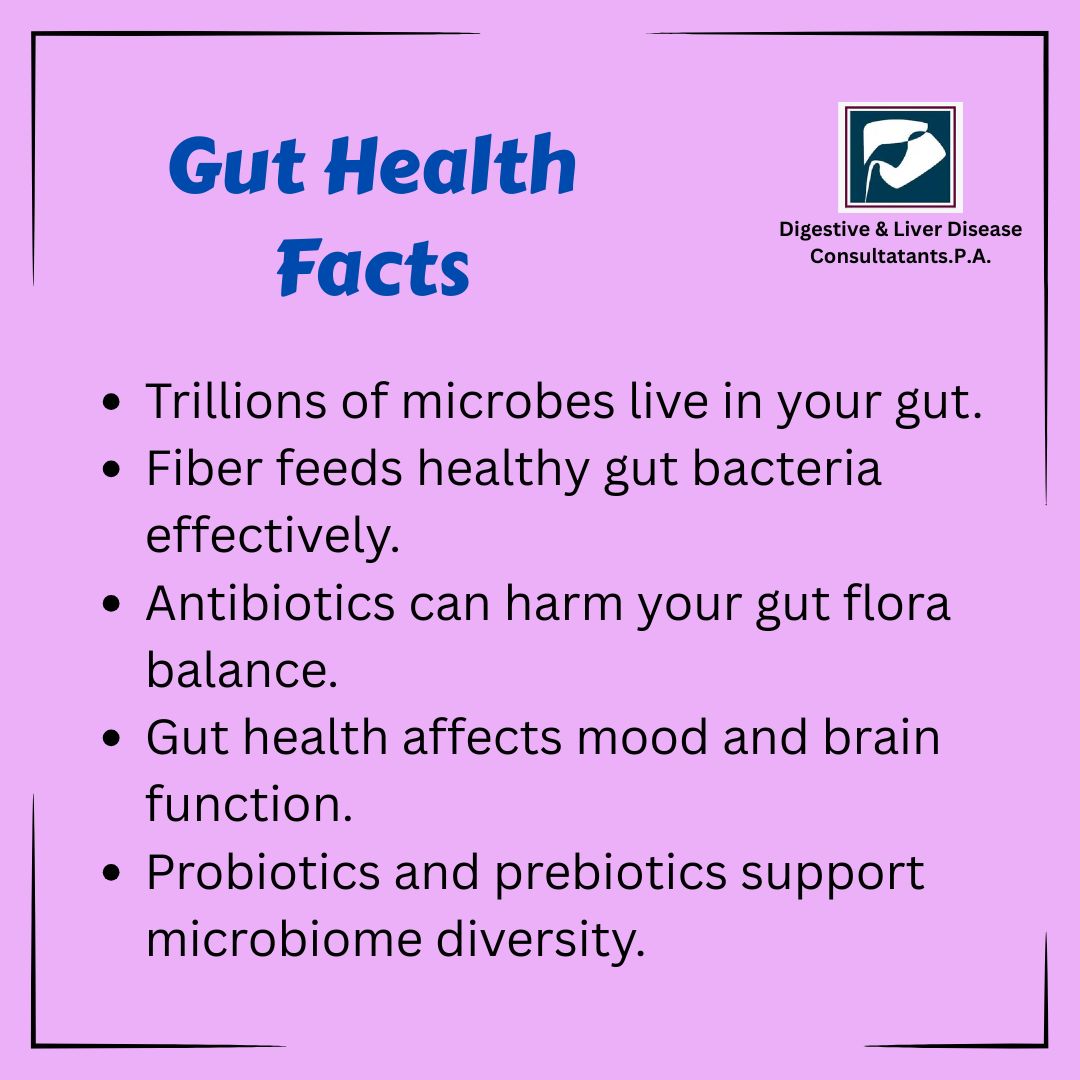Your gut is more than just a place where food is digested. It’s a powerful part of your body that affects your overall health—physically and mentally. At Digestive & Liver Disease Consultants, P.A., we believe in educating patients about the importance of gut health and how it influences everything from digestion and immunity to energy and mood. In this blog, we’ll break down the key facts about your gut and give you simple tips to take better care of it.
1. Your Gut Is Home to Trillions of Microorganisms
Your gut contains a community of microorganisms known as the gut microbiome. These include bacteria, fungi, viruses, and other microbes. In fact, there are more bacteria in your gut than cells in your entire body!
Most of these bacteria are beneficial. They help break down food, produce certain vitamins (like B and K), protect against harmful germs, and keep your immune system strong. A balanced microbiome supports better digestion and reduces the risk of many diseases.

2. A Healthy Gut Supports a Strong Immune System
About 70% of your immune system lives in your gut. A healthy gut lining acts like a barrier, preventing harmful substances like toxins and bacteria from entering your bloodstream.
When your gut is in good shape, your immune system works more efficiently to protect you. On the other hand, if your gut is inflamed or out of balance, your immune system may overreact, increasing your risk of infections, allergies, and autoimmune conditions.
3. Gut Health Is Linked to Mental Health
Ever heard the phrase “gut feeling”? There’s truth behind it. Your gut and brain are connected through what’s called the gut-brain axis. The gut actually produces neurotransmitters like serotonin, which helps regulate mood, sleep, and appetite.
An unhealthy gut may contribute to mental health problems like anxiety and depression. Taking care of your gut can improve not just your digestion but also how you feel emotionally.
4. Fiber Is Your Gut’s Best Friend
Fiber is a type of carbohydrate that your body can’t digest—but your gut bacteria love it. It acts like fuel for the healthy bacteria in your intestines.
Eating a diet rich in fruits, vegetables, legumes, and whole grains helps promote the growth of good bacteria. Fiber also helps regulate bowel movements and prevent constipation.
Tip: Aim for at least 25–30 grams of fiber per day.
5. Processed Foods Can Harm Your Gut
Highly processed foods that are high in sugar, unhealthy fats, and artificial additives can upset the balance of your gut bacteria. These foods can lead to inflammation, bloating, and digestive problems.
Instead, focus on whole, natural foods like lean meats, whole grains, nuts, seeds, and colorful vegetables. They support a healthy gut and provide nutrients that your body needs to function properly.
6. Probiotics and Prebiotics Help Keep Your Gut in Balance
Probiotics are live “good” bacteria found in fermented foods like yogurt, kefir, kimchi, sauerkraut, and kombucha. These can help restore balance to your gut, especially after taking antibiotics or dealing with a digestive upset.
Prebiotics are types of fiber that feed these good bacteria. They’re found in foods like garlic, onions, bananas, asparagus, and oats. A combination of both probiotics and prebiotics can strengthen your gut health.
7. Hydration Matters
Water is essential for digestion. It helps break down food and move it smoothly through your intestines. Staying hydrated also softens stool and prevents constipation.
Make it a habit to drink plenty of water throughout the day, especially if you’re eating more fiber. The two go hand-in-hand for smooth digestion.
8. Antibiotics Can Disrupt Your Gut
While antibiotics are sometimes necessary to treat infections, they can also kill off healthy bacteria in your gut. This can lead to digestive issues like diarrhea, bloating, or even yeast infections.
If you need antibiotics, talk to your doctor about taking probiotics to help restore balance to your gut microbiome.
9. Chronic Stress Affects Your Gut
Stress doesn't just affect your mind—it affects your gut too. When you're stressed, your body releases hormones that can slow digestion, increase gut sensitivity, and lead to symptoms like cramps, gas, and diarrhea.
Practicing stress-relieving techniques like deep breathing, yoga, meditation, and exercise can support better gut function and reduce symptoms.
10. Signs of an Unhealthy Gut
Your body often gives warning signs when your gut isn't in good shape. Common symptoms include:
- Bloating or gas
- Constipation or diarrhea
- Heartburn or acid reflux
- Food intolerances
- Frequent fatigue
- Skin problems
- Mood swings or anxiety
If you’re experiencing any of these, it might be time to consult a gastroenterologist.
How Digestive & Liver Disease Consultants, P.A. Can Help
At Digestive & Liver Disease Consultants, P.A., our team is dedicated to helping you take control of your gut health. We offer advanced care for a wide range of gastrointestinal conditions, including:
- Irritable Bowel Syndrome (IBS)
- Inflammatory Bowel Disease (IBD)
- Acid reflux and GERD
- Liver disease and fatty liver
- Food intolerances and digestive allergies
- Constipation and chronic diarrhea
We understand how uncomfortable and frustrating digestive issues can be. Our goal is to find the root cause and provide personalized treatment plans that help you feel better—inside and out.
Conclusion
Your gut health is the foundation of your overall health. From supporting your immune system to influencing your mood, your digestive system plays a vital role in your well-being. The good news is that you can take simple steps—like eating more fiber, staying hydrated, avoiding processed foods, and managing stress—to keep your gut happy.
Gut issues disrupting life? Consult our top GI specialists at Digestive & Liver Disease Consultants P.A. for clarity and care.






